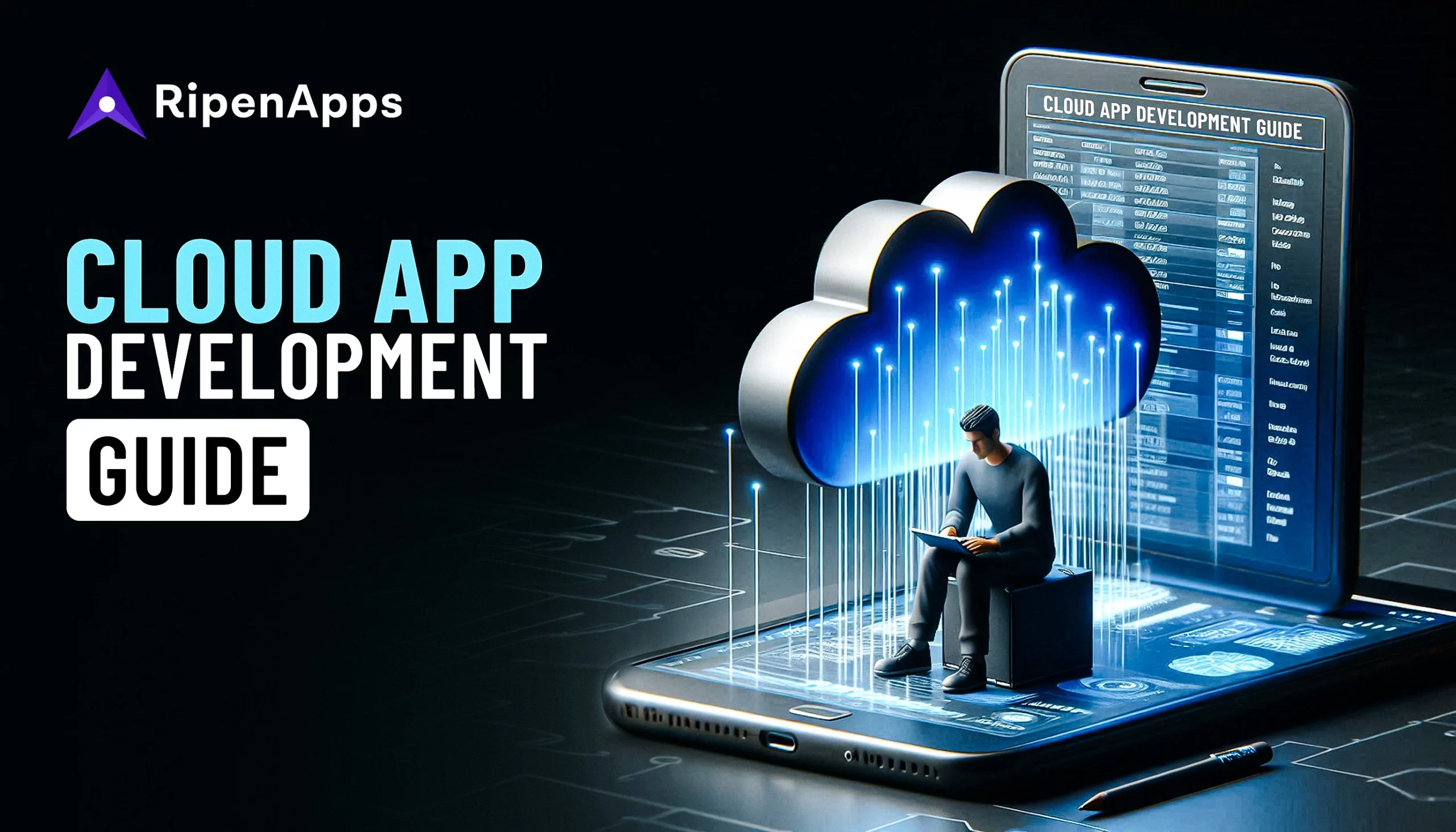Have you ever realized what your mobile app can do when using the power of cloud computing technology?
In today’s fast-moving and tech-driven age, people look for high-speed internet connection and digital services. Whether booking online appointments, ordering food, or accessing any exclusive service, providing fast and on-time services has become a great challenge for businesses.
Especially in the mobile app market, users always look for fast, seamless, and uninterrupted services. For businesses planning to build their mobile app, it becomes a great challenge to meet today’s user’s demands.
The competition in the mobile app sector is becoming more fierce, as the global cloud applications market size is projected to reach $1596.16 Billion at a CAGR of 19.3% between 2024-2030. Startups and business people today need an intelligent approach to build a mobile app that performs incredibly.
And in this case, cloud apps stand at the forefront. Cloud-based applications offer unparalleled flexibility and high-speed performance enabling businesses to respond to evolving market changes in real time. By using cloud computing in mobile apps, businesses can perform at the next level breaking conventional limitations.
So, if you are planning to adopt cloud technology in mobile apps, here in this comprehensive cloud app development guide, we will be explaining very important things. From benefits to development process and cost to key features, you will learn crucial aspects that will help you build a successful cloud-based mobile app for your business.
Table of Contents
What is Cloud App Development?
Cloud app development is the process of creating applications. It leverages cloud computing technologies to deliver services over the Internet. Unlike the traditional software that runs on local computers or servers, cloud applications function on remote servers situated in data centers managed by third-party vendors. This transition to the cloud offers numerous advantages such as scalability, flexibility, and cost efficiency.
Types of Cloud Applications

1. SaaS (Software as a Service)
These are applications hosted and managed by a cloud provider, delivered over the internet. Users can access this type of cloud software through their web browsers. Examples include Google Workspace, Salesforce, and Slack.
2. PaaS (Platform as a Service)
PaaS provides a platform allowing customers to develop, run, and manage applications without dealing with the infrastructure. Developers can focus on coding and deploying applications while the platform handles the backend. Examples include Microsoft Azure App Services and Google App Engine.
3. IaaS (Infrastructure as a Service)
IaaS offers fundamental computing resources such as virtual machines, storage, and networks. Companies like AWS, Azure, and GCP offer IaaS, giving businesses control over their infrastructure.
4. Function as a Service (FaaS)
It enables developers to implement code responding to events without the need for handling servers. Due to this, managing cloud servers becomes easy and more cost-efficient.
5. Container as a Service (CaaS)
This type of cloud computing offers better portability and scalability for deploying cloud-based applications across multiple cloud environments. It uses orchestration tools like Kubernetes for deploying and managing containerized applications.
Read More: Top 10 Cloud Application Development Companies in USA
Key Features of Cloud-Based Applications
- Scalability
- Accessibility
- Cost-efficiency
- Automatic updates
- High availability and reliability
- Security
- Disaster recovery and backup capabilities
- Integration with CRM and other systems
- Monitoring performance metrics
- Customizing applications
The Cloud App Market: An Overview
The cloud app market is a fast-growing segment in the cloud computing industry. This is the space where cloud-based applications are hosted, and from which people can use them alongside standard internet operations.
The adoption of cloud technology in mobile app development is driving this market. This is because current businesses require mobile app solutions that are scalable, flexible, and able to meet the evolving nature of cloud platforms.
Therefore, to remain competitive and meet the changing needs of customers, businesses are continually innovating around these offerings. Today, they deploy advanced solutions such as Artificial Intelligence (AI), Machine Learning (ML), Internet of Things (IoT), or Blockchain in cloud computing to build advanced-level mobile apps.
The cloud applications market size in terms of revenue is estimated to reach $356 Billion by 2025 at a CAGR of 15.8%.
The global enterprise spending on cloud infrastructure services accumulated to USD 270 billion, with a growth of 45 Billion USD to the last year.
Hence, this growing adoption of cloud computing technology in mobile app development signifies the promising future scope of cloud app development.
Key Drivers of Market Growth
- Digital Transformation
- Scalability and Flexibility
- Cost-Efficiency
- Remote Work
Cloud App Development Process: Steps to Build Cloud App
The process of cloud application development consists of thorough planning, selecting appropriate cloud services, designing robust architecture, and ensuring continuous integration and deployment.
However, you should also always keep in mind that staying up-to-date with the latest trends and adhering to best cloud computing practices will help you build a more scalable and future-ready cloud application. Below we have explained the steps of the cloud app development process that will work as a successful roadmap.
Step 1: Idea Generation and Requirement Analysis
To develop a cloud app first step is to generate a billion-dollar app Idea and do a requirement analysis. It is done through brainstorming and identifying what the app is meant for. Make sure you address the intended audience and the problems that the application is to solve.
During this phase, you will need to hire mobile app developers, and cloud experts, or consult a dedicated cloud application development company to accurately build your development plan. This stage sets the base for the whole development process. This is because it will ensure that all people involved in developing it have a similar understanding regarding this idea.
Step 2: Conduct Market Research & Feasibility Study
Once you have established the initial plan and needs, do conduct market research. It involves studying market trends, analyzing competitor situations, and identifying potential challenges.
This research will help you understand the market gaps, preferences of users, and if at all the concept of the app is valid. The in-depth market study will let you assess the technical, financial, and operational feasibility of your project. Thereby you can be assured of whether your app is practical and achievable within set limits.
Step 3: Find a Reliable Cloud App Development Company
One of the most significant steps in this process is looking for the best cloud app development company. This is where it gets serious because if you get it right with your development partner, half of your problems are solved.
They will ensure that your app’s quality and safety levels are all maintained at their highest possible points of excellence. Therefore, you must find an experienced company that works proficiently in cloud app development services.
Step 4: Design Architecture
Architecture design matters a lot when one talks about application development for the cloud. It involves coming up with a blueprint as well as a cloud app development guide to subsequent high-level architecture decisions. This generally includes components, modules, and data flow of an app in question.
To implement all these things in designing the architecture of your cloud app you will have to take key considerations such as load balancing, data storage, and network configuration. Here, your cloud app development company will try to employ these aspects to design a suitable architecture for your cloud application.
Step 5: Development and Coding
After the architecture is set, the actual development or coding phase begins. This happens when mobile app developers start writing the code, developing features as well as linking other necessary services and APIs together.
In most cases, this stage is done in sprints following agile methodologies where an app is created iteratively. Here, you can also ask your cloud app developer to incorporate the latest cloud computing trends to make your app unique.
Step 6: Testing and Quality Assurance
Testing and Quality Assurance (QA) are essential steps. You must follow it to ensure your cloud app functions correctly and meets established quality standards. For this purpose, different types of cloud testing are done. It generally includes unit testing, integration testing, performance testing, as well as security testing.
However, you can also streamline the process by using automated testing tools since they enable faster feedback and better quality assurance coverage. Moreover, QA professionals will also scrutinize every aspect of it before its release date.
Step 7: Deployment and Integration
Deployment means to move an app from its creation platforms. It will be done at the final stage after all testing has been conducted successfully. Here, you need to check proper configurations so that it works properly under live situations.
Benefits of Developing a Cloud App
 So by now, you have got an idea of what it takes to build a cloud-based application. Now, let us explore what benefits cloud apps bring to your business.
So by now, you have got an idea of what it takes to build a cloud-based application. Now, let us explore what benefits cloud apps bring to your business.
1. Scalability and Flexibility
One of the most significant benefits of cloud app development is its inherent scalability and flexibility. Unlike traditional applications that require significant upfront investments in hardware and infrastructure, cloud-based apps can easily scale resources up or down based on demand.
This elasticity allows businesses to handle varying levels of traffic without hampering performance. Whether you’re a startup experiencing rapid growth or an established enterprise dealing with seasonal spikes in usage, cloud solutions allow you to adjust resources dynamically. And also achieve better cloud performance optimization and cost efficiency.
2. Cost Efficiency
Cloud-based application development is a cost-effective alternative to traditional IT infrastructures. Businesses are only charged for resources in use using a pay-as-you-go pricing model.
In this model, firms need not invest heavily in hardware resulting in significant initial investments. Rather they can bring down any ongoing costs associated with regular upgrades and maintenance. Additionally, Start-ups and SMEs can greatly benefit from cost efficiency because they can maximize their IT budgets within limited cash flow.
3. Enhanced Collaboration and Accessibility
Cloud applications enhance collaboration and accessibility. It enables teams to work together seamlessly regardless of their physical location. Data and applications stored in the cloud can be accessed from any internet-enabled device. This is particularly important as it supports remote working.
As a result, this has become increasingly popular and allows for project-based real-time collaboration. Moreover, cloud environments make it easy to adopt shared document features, embedded communication tools, and collaborative workspaces. Hence, they promote productivity and teamwork across distributed teams.
4. Automatic Updates and Maintenance
One of the top benefits of cloud-based development is that the cloud service providers do all of the updates and handle maintenance tasks for an organization. Businesses no longer need to worry about manually applying software patches or scheduling routine system checks. By automated and continuous updates, you save time and resources while at the same time improving the security and stability of the application.
5. Robust Security
Cloud-based app development ensures that data and programs are free from cyber threats. Today, leading cloud service providers invest heavily in security measures such as encryption, multi-factor authentication, and compliance with cloud app security best practices and regulations. These companies go further to provide more advanced security tools and services on a cloud platform that are beyond the reach of many small businesses.
6. Disaster Recovery and Business Continuity
Cloud-based applications come with their own disaster recovery and business continuity solutions. Therefore, this ensures multiple locations where when one of them fails due to hardware breakdowns or other calamities.
This, in turn, ensures that customers can still access them even when their entire data centers have been destroyed by fire or any other disaster since such companies spend much time building hugely expensive backup systems based on physical servers as opposed to mere virtual ones.
Companies need to remain in operation regardless of data loss threats (which might result from unplanned actions), due to the costly nature, long lead time required for replacements coupled with the reputational risks involved
7. Improved Performance and Reliability
Cloud-based programming aids performance improvement because it makes use of advanced infrastructure and technologies. Cloud service providers use high-performance servers, load-balancing techniques, and content delivery networks solutions (CDNs) to ensure that applications run faster without any interruptions.
These technologies help to reduce the time it takes for the server to respond to a request made by a user. Also make sure that no matter how high the number of visitors to the website is, the file will still be available. Consequently, combined with performance monitoring, cloud structures’ dependability enhances user experience quality consistency.
8. Innovation and Competitive Advantage
Cloud-based app development gives innovative ideas and a competitive edge. All artificial intelligence(AI), machine learning (ML), Internet of Things (IoT), and big data analytics are capabilities introduced by cloud platforms to make them more advanced than our current models.
These capabilities help companies come up with solutions that are new in the market. Through this, companies derive insights from their data leading to improved revenue stream generation. Hence, by staying ahead of their rivals, a business can differentiate itself from others and better meet their customers’ changing needs.
Use Cases of Cloud Apps for Different Industries
Cloud-based applications provide versatile solutions in various industries. It helps companies to improve efficiency, enhance customer experience, as well as scale operations continuously. Since cloud technology comes with great flexibility and scalability it can be integrated into various industry verticals as given in the below examples.
1. Education
Online e-Learning Platforms
Canvas and Blackboard are cloud-based learning management systems (LMS) that enable virtual classes, course management tools, and student assessments. This eLearning application uses cloud solutions to let teachers upload course materials, conduct quizzes, and interact with the students online.
Collaboration Tools
Google Workspace and Microsoft Teams provide cloud-based tools that offer real-time collaboration between students and teachers. These features support distance learning through video conferencing, sharing documents, and instant messaging services.
2. E-commerce
Scalable Cloud-Based Ecommerce App
Platforms like Shopify and BigCommerce take advantage of cloud infrastructure to deliver scalable, reliable, and secure online stores. By implementing cloud computing in e-commerce apps they are capable of handling different sizes of traffic without any downtime.
Inventory Management
TradeGecko or Zoho Inventory are examples of using cloud technology in inventory management software. They use this system to track levels of stock, manage orders, and real-time optimization of supply chain processes.
3. Fintech
Through the use of cloud-based apps, digital banking platforms can securely and efficiently provide online banking, mobile payments, and financial management services.
Fraud Detection
This process involves the use of cloud-based AI or machine learning algorithms to analyze transactional data and detect and curb illegal activities on time. So, with the help of the cloud, fintech applications protect both financial institutions from loss and their customers from fraudulent cases.
4. Food
Online Ordering Systems
Cloud-based apps such as Uber Eats and Grubhub allow hoteliers to handle their online orders. Cloud-based food delivery applications allow efficient delivery logistics as well as communication with their customers.
Supply Chain Management
It is possible for food businesses to manage inventory, and suppliers. Or even timely delivery of ingredients by using cloud-based applications to reduce waste while improving operational efficiency.
5. Travel
Booking and Reservation Systems
People can make online reservations through the internet by use of cloud computing-based booking websites like Booking.com and Expedia, where they can view, compare, and book accommodations and services in real time.
6. Healthcare
Electronic Health Records (EHR)
There is a high scope for cloud computing in healthcare. Healthcare providers can now store patient records using cloud-based EHR systems such as Epic and Cerner hence enhancing coordination and quality of care. For individual practitioners, adopting the best EMR for solo practice can further streamline patient record management and improve efficiency.
Telemedicine
Using cloud technology these days in telemedicine app development like Teladoc and Amwell offer remote consultations allowing patients to receive medical advice on diagnosis and treatment from their homes with comfort.
Cost of Cloud App Development
Now comes the most important question-how much does cloud app development cost?
Several factors can lead to huge variations in costs including the type of app, level of complexity as well as demanded features. Below is a table detailing the cost of cloud application development for different types of cloud applications.
| Type of Cloud App | Cost Range |
| Simple Cloud App | $10,000 – $30,000 |
| E-commerce Platform | $30,000 – $100,000 |
| Custom CRM | $20,000 – $60,000 |
| Healthcare App | $50,000 – $90,000 |
| Fintech Application | $60,000 – $100,000 |
| Travel Booking System | $40,000 – $120,000 |
| Education Platform | $30,000 – $80,000 |
| Custom IoT Solutions | $70,000 – $150,000 |
| Enterprise Resource Planning (ERP) | $90,000 – $200,000 |
| Social Media App | $50,000 – $100,000 |
| Gaming App | $60,000 – $150,000 |
| Telemedicine App | $40,000 – $150,000 |
Cloud App Development Cost: Region Wise
| Region | Cost Range (USD) |
| North America | $50,000 – $250,000 |
| Western Europe | $40,000 – $200,000 |
| Eastern Europe | $30,000 – $120,000 |
| South Asia | $20,000 – $80,000 |
| Southeast Asia | $25,000 – $90,000 |
| Latin America | $30,000 – $100,000 |
| Australia | $40,000 – $150,000 |
| Middle East | $35,000 – $120,000 |
| Africa | $25,000 – $70,000 |
Conclusion
Cloud computing is a powerful and future-proof technology that empowers businesses of all sizes to scale up efficiency and growth. With cloud-based mobile apps, startups, and companies can obtain better outcomes, enhance performance and reduce overall operational costs.
Therefore, investing in cloud app development services is a strategic move for all businesses that are looking to build a future-ready mobile application. However, since this requires technical intelligence to implement cloud computing in mobile apps, it is wise to hire the best app developers for startups for this purpose.
FAQs
Q1. What is a Cloud Application?
A cloud application is a software program that operates in the cloud environment rather than on a local computer or server. It relies on cloud computing infrastructure to deliver services over the Internet, enabling users to access it from anywhere with an Internet connection.
Q2. How to Develop Cloud Application?
There is a simple process for cloud application development. However, since it is a complex process it is advisable to consult a professional cloud app development company.
- Define Requirements: Determine the app’s purpose, target audience, and key features.
- Choose a Cloud Service Provider: Select a provider like AWS, Azure, or Google Cloud.
- Design the Architecture: Plan how the application components will interact in the cloud.
- Develop the Application: Use programming languages and frameworks suitable for cloud environments.
- Implement Security: Ensure data protection and compliance with relevant regulations.
- Deploy and Test: Deploy the application to the cloud and conduct thorough testing.
Q3. How Much Does it Cost to Build a Cloud-Based App?
On average, the cost of developing a cloud-based mobile app can go between $15,000-$30,000. However, the cloud app development cost varies depending on the app’s complexity, features, and the development team’s rates. The best way to get the right cost estimation would be to get a price quotation from a cloud application development company based on your project needs.
Q4. Which Cloud Service Provider is Best for Cloud-Based Mobile App Development?
AWS, Azure, and GCP are prominent names in leading cloud service providers. However, each provider comes with different needs and preferences. Therefore, you should choose according to your budget and required solutions.











 India
India USA
USA Australia
Australia Canada
Canada UK
UK UAE
UAE
